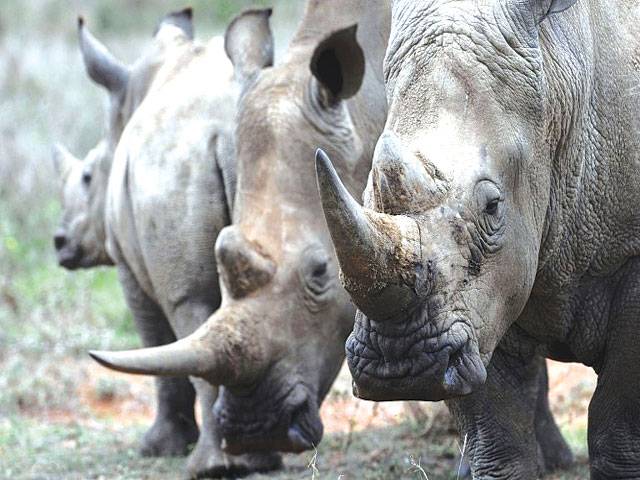BEIJING-China on Tuesday defended its controversial decision to ease a 25-year ban on trading tiger bones and rhinoceros horns after conservationists warned that the government had effectively signed a “death warrant” for the endangered species.
The State Council, China’s cabinet, unexpectedly announced on Monday that it would allow the sale of rhino and tiger products under “special circumstances”. Those include scientific research, sales of cultural relics, and “medical research or in healing”. The country’s previous regulations on rhino horn and tiger bone products did not consider the “reasonable needs of reality”, such as those from scientific research, education, and medical treatment, foreign ministry spokesman Lu Kang said Tuesday. China has also improved its “law enforcement mechanism” and plans to step up efforts to crack down on illegal wildlife trade, Lu said at a regular press briefing.
China prohibited the trade of rhino horn and tiger bones in 1993 but a black market has flourished, with many products entering the country through Vietnam, according to an investigation conducted last year by the Elephant Action League conservation group.
Wildlife campaigners fear that the new rules could fuel the illegal trade and further put the animals at risk of being poached.
“With this announcement, the Chinese government has signed a death warrant for imperilled rhinos and tigers in the wild who already face myriad threats to their survival,” Iris Ho, senior wildlife programme specialist at Humane Society International, said in a statement.
But the State Council said the trade volume will be “strictly controlled”, with any sale outside of authorised use to remain banned.
The newly sanctioned areas of trade will also be highly regulated.
Only doctors at hospitals recognised by the State Administration of Traditional Chinese Medicine will be allowed to use powdered forms of rhino horn and tiger bones.
Tourism and cultural heritage authorities will also have to approve any rhino and tiger products that are used for “temporary cultural exchange”.
- ‘Total outrage’ -
Despite a lack of scientific evidence, demand for rhino horn and tiger bone is partly driven by their supposed health benefits, from curing cancer to boosting virility.
Today, synthetic alternatives exist for a number of animal-based remedies, such as bear bile, which is effective in treating liver cancer.
“The use of wild animal parts such as rhinoceros horns and tiger bones is very limited in the traditional Chinese medicine,” Lan Jirui, a traditional Chinese medicine doctor in Beijing, told AFP.
“It was used in ancient times, but now we have alternative products,” he added, emphasising the efforts that doctors of traditional Chinese medicine have made in wildlife protection.
For rhino horn and tiger bone used for medical research or treatment, the council said only farmed rhinos and tigers can be used, excluding those raised in zoos.
But activists were not reassured by the regulations.
Farmed wildlife are “born into a miserable life of suffering, and then killed for use in medicinal products. It’s a total outrage,” said Kate Nustedt, a programme director at World Animal Protection, an animal welfare non-profit organisation.
Up to 6,000 captive tigers -- twice the global wild population -- are estimated to be in held in about 200 farms across China.
In 1960, there were an estimated 100,000 black rhino in Africa -- today there are fewer than 28,000 rhinos of all species left in Africa and Asia, according to a 2016 UN World Wildlife Crime Report.
Southern white rhinos are “near threatened” but others such as the black and Sumatran rhinos are critically endangered, according to WWF.
China has made efforts to crack down on the sale of illegal wildlife products such as ivory in recent years.
The country’s ban on ivory sales went into effect in December 2017 -- an attempt to rein in what used to be the product’s largest market in the world.
A partial ban on ivory had already resulted in an 80 percent decline in ivory seizures entering China and a 65 percent drop in domestic prices for raw ivory, according to a report last year by state media Xinhua.






